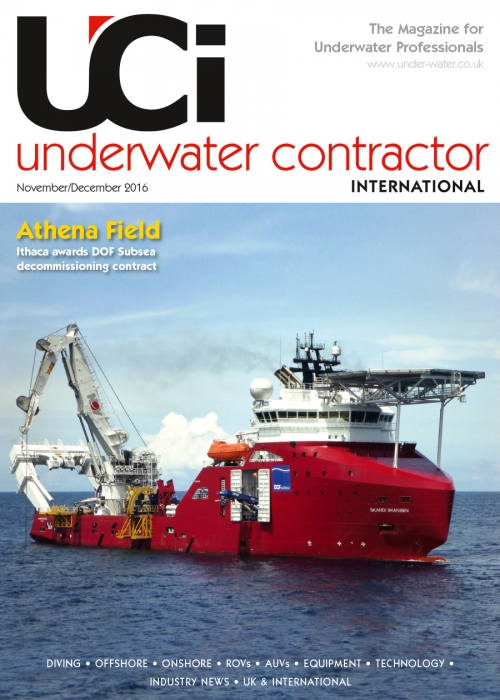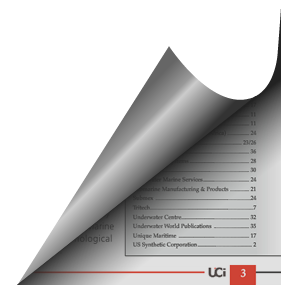
The Magazine for Underwater Professionals
![]() May/Jun 2016
May/Jun 2016
EUROPE
Facing the big EU divide
Brexit may not be the best choice for the UK's ocean technology sector, says Paul Eastaugh
The UK ocean technology sector supports a range of industries that operate in their own commercial bubbles. Offshore oil and gas, marine renewables, oceanographic research, hydrographic survey, equipment manufacture, civil engineering or commercial marine are largely independent commercially but at least have this magazine in common. Another thing they share is that on 23 June those working in these sectors will be able to decide what is best for their business or family and vote on Britain’s EU membership.
Oddly, when researching this article I encountered an almost total embargo on companies willing to give their opinions on the subject. Even Subsea UK, the trade body tasked with supporting its members, refused to be drawn on the subject and give an opinion.
A notable exception was Atlantas Marine whose managing director, Charlie Foll, immediately gave his verdict on life outside the EU. “It would be national suicide,” he said “I’m totally for staying in.” Atlantas Marine is the world’s leading distributor for VideoRay ROVs and it also provides observation-class ROV services to customers in a wide range of industries. Easy access to international markets is therefore essential and the prospect of travelling Europe with customs carnets fills him with dread. “I never want that again,” he said.
He added: “It definitely pays our business to stay in. Working in Europe is easy and we’ve a close relationship with Ocean Systems in Sweden who are an important ROV supplier. If we leave and the value of the pound falls as low as is predicted, the increased cost of spare parts will definitely have an impact on us.
“I also value the other benefits that we get from EU membership. The EU laws have been a positive benefit to how we live, especially the CE mark which ensures the safety of everything we use. People often forget how, when you bought something like a toaster you would have to fit your own plug – which was not exactly safe. Swimming off the east coast when I was young was like bathing in raw sewage but now, thanks to the EU, our beaches are clean, agricultural pollution is controlled and farmers are encouraged to protect wildlife and the environment. Our youngsters also have fantastic opportunities to study in Europe that cost their parents next to nothing. Given the trouble we’ve had from our bankers, legislation controlling financial services is no bad thing either. When people say that there is too much legislation in Europe I can’t help being suspicious that they simply don’t want to do what’s right. Admittedly, Europe is far from perfect but I just enjoy being a European and I think that there are many others like me.”
PART
One of those is Duncan Cunningham who, as international sales manager for Norwegian magnetic technology and salvage specialists Miko Marine, has a different perspective on the subject. He is also vice chairman of the UK’s Society of Maritime Industries and although the Society has no official line on the subject, he spoke independently; “We can’t be involved in fixing standards for our industry if we are not part of the bigger picture,” he said. “I also regularly see how Norway has no say in the regulations that the EU imposes on it and for us to put ourselves in the same position would be madness. We need EU membership to stay involved.”
Angus Cooper, business development manager for Bibby Hydromap, was more relaxed about the referendum outcome. Speaking personally, he pointed out that the survey services his company provides are largely unaffected by EU membership. “The most important thing is for us to have local representation in the country where we want to do business,” he said. “That overcomes language and cultural difficulties but with the UK and Norway being the principal oil and gas customers, and the UK being the biggest market for offshore renewables, it’s hard to see how our business will be affected either way.”
For the ocean technology industry the importance of trade deals is also uncertain as it is already truly international. The Leave campaign’s offer of the freedom to embrace “exciting new markets around the world” is largely meaningless as companies in the sector are busy doing it already. It is not unreasonable to assume that other UK industries are doing the same and that if there really are golden new opportunities waiting in countries such as China or India they would have found and exploited them already, regardless of the availability of new trade deals.
The Article 50 rule under which a country may leave the EU, states that it must enter a trade agreement with the departing country. It does not, however, specify how long it might take to negotiate and the terms that might be concluded. Economists cannot factor-in the value of goodwill and all indicators are that this will be in short supply if Britain leaves the EU. German banks and French insurance companies can’t wait for the UK to leave and will not surrender the advantages over the City of London that they will be gifted by the departure. The French economy minister, Emmanuel Macron, has already said that Britain would be “completely killed” in trade negotiations were it to leave the EU. During a recent edition of Radio 4’s Broadcasting House the head of a big investment fund said: “I spend a lot of time in Europe talking with policy makers, regulators, government officials and some companies and there is no mood for an amicable divorce if this marriage is severed.”
INTEREST
UK businesses must recognise the signs that negotiation of the country’s departure from the EU is likely to be a long and messy affair. Brussels has no interest in seeing Britain’s venture succeed so, at the very least, its bureaucrats can be expected to perform with the alacrity of Ming Dynasty mandarins. Putting two fingers up at your most important market is hardly a sensible tactic for negotiating new terms afterwards and although we import more from Europe than they buy from us, the bulk of those imports come from just two or three countries in the Union. Yet any trade deal must be agreed with all 27 EU members and since the Poles, for example, may not care whether Germany can sell its BMWs to Britain, they may be in no hurry to agree a deal. This uncertainty is likely to affect everything in the UK from trade, manufacturing, social services and finance for a considerable time. Because uncertainty is the enemy of business, companies in the ocean technology sector must be ready to cope with neurotic markets and a lack of investment. It has already been accepted that the pound will lose value, suggested by some at up to 20%, and this will increase costs of travel and raw materials. For companies already suffering from the decline in oil prices, an extra shock may not be welcome. UK businesses must be ready to cope with the consequences of leaving the EU and voters must consider whether there are any benefits that justify them, especially those that are largely aimed at massaging national vanity.
It is not unreasonable for the Remain campaign to be called “Project Fear” because the government is genuinely afraid of what will happen if the UK leaves the EU. The entrepreneurs who honestly believe that Britain can muddle through and “make a go” of leaving the EU disregard the fact that Britain is a huge and complex economic and social structure that, unlike an individual business, is unsuited to cavalier adventures. The predicted job losses and price rises will be felt by those least able to cope with them and referendum voters must bear that in mind when marking their ballot.
As with all business ventures, when nothing is certain decisions must be taken on the balance of probability. With extensive data supporting the case for remaining, a pros and cons list may look rather one-sided and every responsible business manager in every industry needs to bear this in mind when reaching a decision on how to vote.
Paul Eastaugh is managing director of PEMS Marine & Offshore PR, specialising in PR support for companies in the commercial and leisure marine and the offshore industries.


